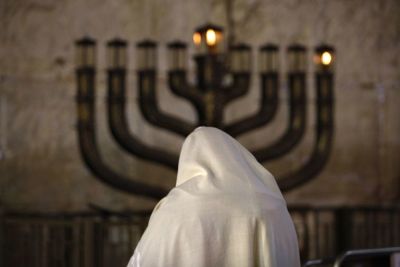Jewish diversity, religious pride and spiritual fulfillment

A 2016 Pew Research Center survey found that “nearly all Israeli Jews self-identify with one of four subgroups: Haredi (“ultra-Orthodox”), Dati (“religious”), Masorti (“traditional”) and Hiloni (“secular”).” "Those secular in their outlook are by far the largest Jewish group in Israel, making up roughly half (49%) of Israeli Jews."
Sadly, 40% of secular Jews in Israel “do not believe in God at all.” And 83% of secular Jews "see being Jewish as a matter of ancestry and culture rather than as a matter of religion.” As 97-year-old actor Mel Brooks said, “I’m rather secular. I’m basically Jewish. But I think I’m Jewish not because of the Jewish religion at all.”
Thankfully, there are Jewish men and women from all subgroups of Jewish self-identity who have come to believe in Yeshua (Jesus) as Messiah. Have they abandoned their Jewish roots? Not at all. In fact, it is just the opposite. They have actually drilled down deeper into their Jewish heritage. You see, there is nothing more Jewish than accepting the Jewish Messiah into your heart and life. Just ask the Apostle Paul.
Prior to meeting the Messiah on the Damascus road (see Acts 9:1-18), Paul was known as Saul of Tarsus. And before becoming a follower of Yeshua, Saul’s heart was filled with religious pride. Paul described the self-righteousness that consumed him in those earlier years: “If anyone thinks he has reasons to put confidence in the flesh, I have more: circumcised on the eighth day, of the people of Israel, of the tribe of Benjamin, a Hebrew of Hebrews; in regard to the law, a Pharisee; as for zeal, persecuting the church; as for legalistic righteousness, faultless” (Philippians 3:4-6).
Religious pride deceives those who wallow in it. Author Alexander Strauch wrote, “One of the awful things about pride is that it deceives us; we may think we are serving God and others, but in reality we are serving only ourselves.” Saul was not serving God, but only himself with his egotistical attitude of religious superiority.
Some Jewish people meet the Messiah after a bad experience with religion. A case in point is an Israeli Jew named Sahar. He said, “The straw that broke the camel’s back for me was when a really close friend of mine was ill with a terminal illness, and his family were at a loss. His parents invited a rabbi to come and bless him and pray for him. And that rabbi demanded tens of thousands of shekels to come to the hospital and to ‘heal’ him. That just broke me. I didn’t know God, but I knew that was not the way to get to Him.”
Sahar went on to say, “So I grew up in Bat Yam. Around my house were five synagogues, and it always amazed me that people would go about the whole year stealing, lying, cheating, but when Yom Kippur came around, they would wear a kippah on their head, put on a prayer shawl, spend 4-5 hours in the synagogue, being holy, but the very next day they would carry on with their ways of sinning — back to their lies and stealing … So I decided to read the New Testament. I was reading a story about a Jewish man, here in Jerusalem, a story written by Jewish people, to Jewish people. I was just really surprised — amazed.”
Sahar said he couldn’t find a single thing wrong with Yeshua. “God changed my heart. Today I work with children with special needs. I love them, and I want to give to them and to show them just how God has loved me and loves you.” Sahar has found spiritual fulfillment in the Person of Yeshua, as have so many others. Jonathan Bernis, author of A Rabbi Looks at Jesus of Nazareth, said, “It is likely that there are more Jewish people who believe in Jesus as Messiah today than in any time since the first century — and perhaps in even greater numbers today than then.”
Jewish people who accept Jesus as the Messiah have come to understand that Yeshua fulfilled the Old Testament prophecies written about Him. In addition, a relationship with Christ has given them true joy and lasting peace.
A Messianic Jew named Elaine said, “No matter how many clothes I bought, no matter how many houses we had, my life was empty. It’s like I had a hole inside me.” She would later learn what it means to be born again. She said, “I prayed and I accepted Yeshua. That’s just the beginning.” “If you read Isaiah 53, it tells you He was pierced for our transgressions; all our iniquities were put on Him; and those stripes that were on His back are the very things that heal us … and so to people who say to me: ‘You can’t be Jewish and believe in Jesus;’ I say, ‘I’m Jewish and I do believe in Jesus.’”
Dr. Stuart Dauermann was born into a conservative Jewish family in Brooklyn, New York. He said, “Yeshua said of Himself, ‘I am the door’” (John 10:9). Many people treat Yeshua like He is the exit from Jewish life. I think that’s wrong. He is the door for me into a more passionate engagement with Jewish life. And also a total passionate engagement with the God of Abraham, Isaac and Jacob.”
Paul, Sahar, Elaine and Stuart all found peace and spiritual fulfillment in Yeshua, the Jewish Messiah. But that is just the tip of the iceberg. Here are 100 video testimonies of Jewish men and women who accepted Yeshua. The same contentment can be yours if you will receive Jesus by faith. “Yet to all who received Him, to those who believed in His name, He gave the right to become children of God” (John 1:12).
Simply pray: “Yeshua, I believe you are the promised Messiah. I receive you as my Savior. Forgive my sins. Fill me with the Holy Spirit. Live in my heart Lord Jesus. I want to follow you today and always. Amen.”
Dan Delzell is the pastor of Redeemer Lutheran Church in Papillion, Nebraska.




























